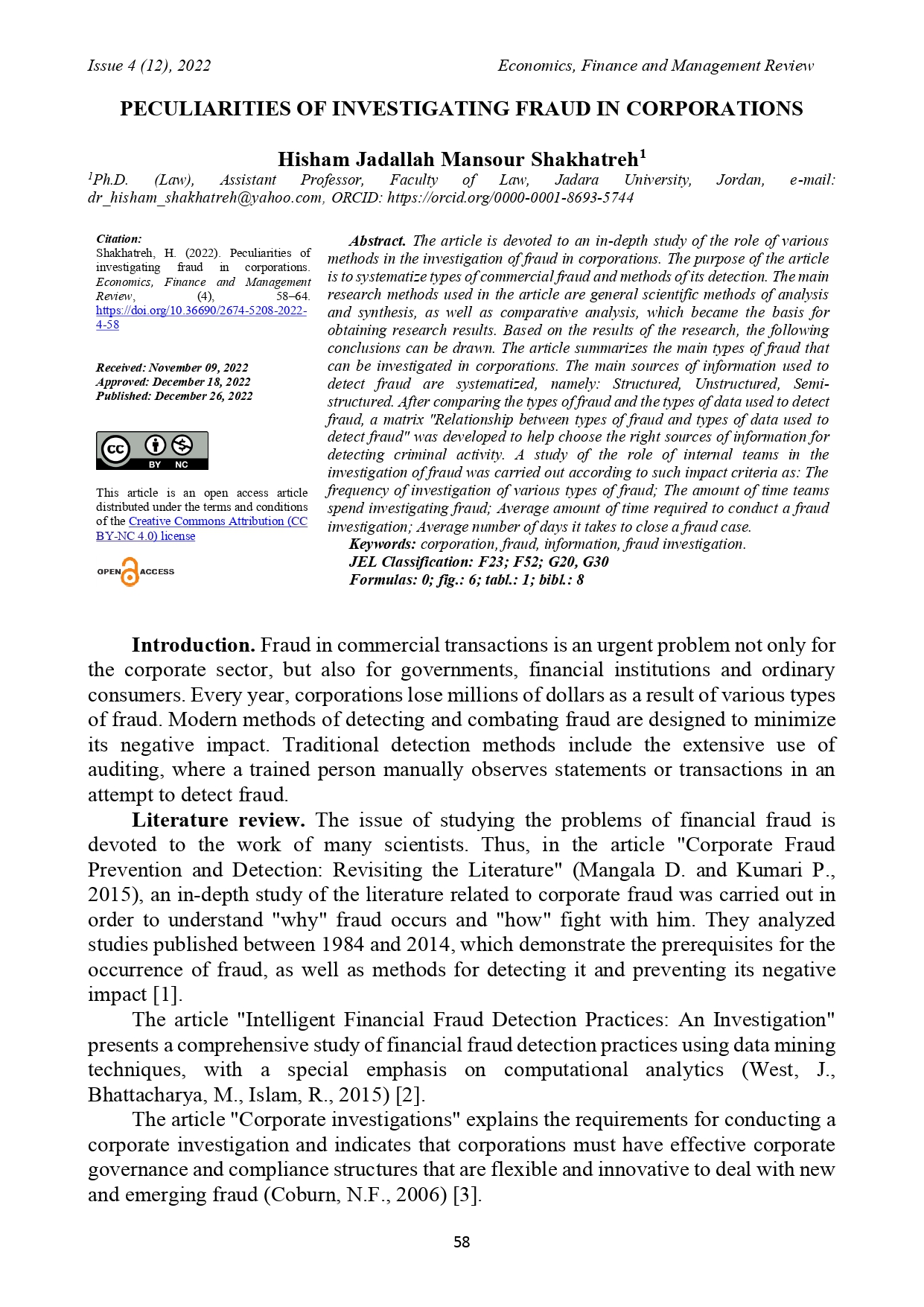PECULIARITIES OF INVESTIGATING FRAUD IN CORPORATIONS
DOI:
https://doi.org/10.36690/2674-5208-2022-4-58Keywords:
corporation, fraud, information, fraud investigationAbstract
The article is devoted to an in-depth study of the role of various methods in the investigation of fraud in corporations. The purpose of the article is to systematize types of commercial fraud and methods of its detection. The main research methods used in the article are general scientific methods of analysis and synthesis, as well as comparative analysis, which became the basis for obtaining research results. Based on the results of the research, the following conclusions can be drawn. The article summarizes the main types of fraud that can be investigated in corporations. The main sources of information used to detect fraud are systematized, namely: Structured, Unstructured, Semi-structured. After comparing the types of fraud and the types of data used to detect fraud, a matrix "Relationship between types of fraud and types of data used to detect fraud" was developed to help choose the right sources of information for detecting criminal activity. A study of the role of internal teams in the investigation of fraud was carried out according to such impact criteria as: The frequency of investigation of various types of fraud; The amount of time teams spend investigating fraud; Average amount of time required to conduct a fraud investigation; Average number of days it takes to close a fraud case.
Downloads
References
Mangala, Deepa and Kumari, Pooja, Corporate Fraud Prevention and Detection: Revisiting the Literature (January 1, 2015). Journal of Commerce & Accounting Research, Volume 4, Issue 1, January 2015, pp 35-45, Available at SSRN: https://ssrn.com/abstract=2678909
West, J., Bhattacharya, M., Islam, R. (2015) Intelligent Financial Fraud Detection Practices: An Investigation. In: Tian, J., Jing, J., Srivatsa, M. (eds) International Conference on Security and Privacy in Communication Networks. SecureComm 2014. Lecture Notes of the Institute for Computer Sciences, Social Informatics and Telecommunications Engineering, vol 153. Springer, Cham. https://doi.org/10.1007/978-3-319-23802-9_16
Coburn, N.F. (2006), "Corporate investigations", Journal of Financial Crime, Vol. 13 No. 3, pp. 348-368. https://doi.org/10.1108/13590790610678422
Mangala, D., & Kumari, P. (2017). Auditors’ Perceptions of the Effectiveness of Fraud Prevention and Detection Methods. Indian Journal of Corporate Governance, 10(2), 118–142. https://doi.org/10.1177/0974686217738683
Report to the Nations. URL: www.acfe.com.
Zhu X, Ao X, Qin Z, Chang Y, Liu Y, He Q, Li J. Intelligent financial fraud detection practices in post-pandemic era. Innovation (Camb). 2021 Oct 20;2(4):100176. doi: 10.1016/j.xinn.2021.100176. PMID: 34806059; PMCID: PMC8581570.
Mihus, I. Corporate fraudsters: who are they?. International Conference on Corporation Management, Estonia, dec. 2020. Available at: <https://conf.scnchub.com/index.php/ICCM/ICCM-2020/paper/view/142>
Mihus, I. (2022). POSSIBILITIES OF USING BLOCKCHAIN TECHNOLOGIES TO PROTECT FRAUD. Science Notes of KROK University, (1(65), 84–94. https://doi.org/10.31732/2663-2209-2022-65-84-94

Downloads
Published
How to Cite
Issue
Section
License

This work is licensed under a Creative Commons Attribution-NonCommercial 4.0 International License.








